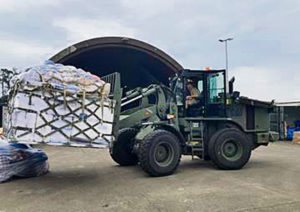
Donations which poured in to support the Afghan evacuation efforts at Ramstein Air Base continue to benefit evacuees outside the installation.
Donations have been redirected from Ramstein to other bases during the Afghan evacuation operation.
A total of 34,000 clothing kits were made and delivered to six pod populations, primarily at nearby Rhine Ordnance Barracks.
One pallet of donations will go to the North Atlantic Treaty Organization. Additional pallets are being put together which include lost or unattended luggage belonging to evacuees now in the U.S.
“The Ramstein community was so generous donating items for the evacuees,” said Senior Master Sgt. Timothy Okkerse, 724th Air Mobility Squadron transportation chief. “They donated an abundance of stuff from blankets and children’s clothes to women’s health items. We had more than we needed, so we were able to vector this to the United States.”
The donations are critical to making sure that evacuees can sustain themselves as evacuees work through their transition to their next location.
Flexibility has been necessary throughout this operation. Due to a small number of stateside measles cases among newly arrived evacuees from Afghanistan, the U.S. Centers for Disease Control and Prevention mandated a brief pause in outbound flights until medical personnel distribute vaccines. Donations are being redistributed to current communities to accommodate evacuees.
Complete clothing sets will be distributed, including sweatpants, sweatshirts, underwear, shoes, socks and jackets to the 5,000 adult evacuees to help with their current needs.
“After learning of the retention of our population, we walked all of the assembled pallets, identified which ones we had stacked and pulled four of them back,” said Maj. Kevin Rasmussen, 86th Dental Squadron chief of oral and maxillofacial surgery.
The base’s 2,500 volunteers collected more than $1.3 million in donations weighing over 110 tons during this operation.
“These are the people that helped us for over 20 years in Afghanistan and we’ve got to take care of them and give them a soft landing when they get to the states,” said Okkerse. “It’s important that they have basic humanitarian supplies.”


